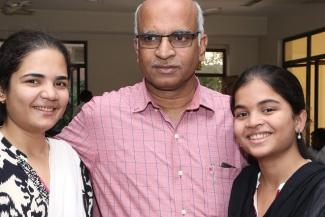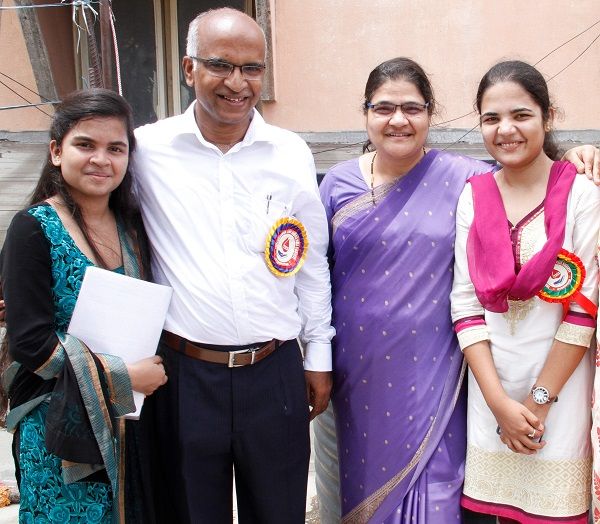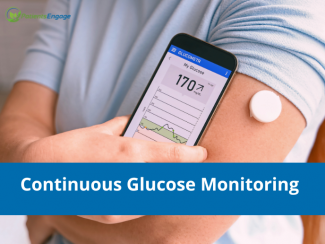
Azra Fatima, 27 and her younger sister Arsheen Fatima both have thalassemia major and are partners in pain. Azra talks about the motivation provided by her family and her passion for her career. Also, tips by Mr. Aleem Baig for parents of children with thalassemia.
Please tell us a bit about your condition
I am a thalassemia major patient. Thalassemia is a genetic blood disorder in which the body doesn’t produce adequate haemoglobin because of the destruction of red blood cells.
When were you diagnosed?
I was diagnosed with thalassemia when I was 4 years old
What were the early symptoms?
According to my parents, my developmental milestones were delayed and I was growing pale everyday which led to my breathing problems. There was also an enlargement of my spleen due to which my stomach was big and tight which was misdiagnosed by doctors initially. I was put on iron supplements which complicated my condition further.
Is there a history of any kind of thalassemia or related condition in your family?
No previous history of thalassemia but there are thalassemia carrier traits in my paternal and maternal family
What is your present condition?
Presently my condition is better and I am able to manage my day to day living along with my required medical treatment.
I take transfusions every 15 days and I am on iron chelating drugs (one oral and infusions as well). I maintain my Hb 9gms pre transfusion and my ferritin levels are around 2000.
What medications are you on?
- Deferral injections+ Asunra ( for chelating iron)
- Folvite
- Calcium tablets
Were there any side-effects of the medicines?
No major side effects but little bit of drowsiness
What were some of the challenges you faced while handling your condition?
I suffered from some emotional challenges related to my physical growth. I was also upset by the behavior of my peers at school, after they got to know that I was suffering from thalassemia. The sympathetic attitude of others also used to irritate me. Extra care used to be taken by my family and school because of my condition
Have you learnt anything in managing this condition?
- I have learnt to adjust the daily hassles
- I have learnt to accept the things as they come
- I have grown stronger and patient
- I have become empathetic to others
What kind of specialists do you consult and how often?
I consult a hematologist, cardiologist, ophthalmologist, and dentist periodically every 6 months or so.
What resources are available to you in your city to help you in managing the condition?
We now have a NGO society run by doctors and parents of thalassemia called Thalassemia and Sickle Cell Society at Hyderabad which gives blood bank services, day care services for blood transfusions and a pathological lab under one roof.
Have you had to make some changes to your lifestyle because of your condition?
Not really but I have adopted some lifestyle habits because of this condition which help regulate my health needs and medical compliances.
Considering that thalassemia is not much understood by most people, how difficult was it for you to find acceptability?
It was difficult for me to make people understand about the condition which was usually confused with cancer. It was also a task to consult a local physician for any medical assistance because they used to just avoid prescribing any medication knowing the history of thalassemia and used to avoid taking any risk because of a lack of complete knowledge about the disease.
Have you tried complementary medicine or therapies, like homeopathy or yoga?
In my childhood I had tried a Unani medication which complicated my condition leading to severe jaundice
Has it been difficult emotionally to cope with your condition?
Yes it was but with a supportive family and friends I could cope with it easily. Special credit goes to my companion ‘my youngest sister’ who also suffers from thalassemia. Since both of us suffer from the same condition, it has become easy for us to fight thalassemia. We have become partners in pain.
How has your family supported you in this?
We have both received full support from our family, whether it be for psychological or medical needs. They let us grow and achieve our dreams and never made us feel that we’re different

Did you see a counsellor for support? Were you offered counselling by doctor?
No but I feel there should be a counsellor for thalassemia patients who can help them reduce their and their family’s emotional burden and work for the better quality of living. With the same intention I completed my Psy.D in clinical psychology to work for children suffering from chronic illnesses like these.
What was the hardest part of suffering from thalassemia?
Looking back it doesn’t seem so hard as thalassemia has helped groom my personality in a better way
What kept you going?
My family and my passion for my career.
How has this changed your perspectives in life?
This has taught me to be thankful to God and be happy with what you have instead of asking for more all the time. There is definitely a purpose why one has been sent in this world. So one should make the most of it.
A Struggle To Arrange Blood Transfusions For My Daughters
Mr Aleem Baig shares his experience of having to deal with challenges of two daughters being diagnosed with thalassemia. .
1. At what age were your daughters diagnosed with thalassemia?
One at the age of 4 years and another when she was 6 months old
2. How did you come upon the diagnosis?
There is a 6 year gap between my daughters s and as the elder one was already diagnosed with thalassemia it was easy to identify the symptoms in my youngest child
3. How did you go about handling the situation?
It was stress provoking initially but with time we accepted the fate and treated them the same as our eldest child who is thalassemia free, giving them the equal freedom to fulfil their dreams
4. What were the major setbacks you faced?
Back then when they were younger the most important challenge was to arrange for transfusion. Since awareness about thalassemia was limited , there was also a shortage of blood donation, which made it difficult to arrange for blood every month.
5. Please share some tips for parents of children with thalassemia.
- As a parent of a thalassemic child, we need to first understand that there should be proper compliance to medical needs like the transfusion and the chelation treatment and also keep them on regular medical check ups to avoid complications
- Accept them as they are so they do should not feel the burden of their disease. I think acceptance is key to every solution
- Let them be as normal as others and let them grow socially, psychologically and physically healthy
- Educate them and empower them
- Let them pursue their dreams






